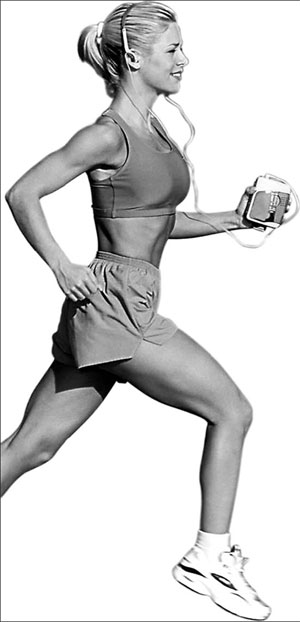Quicken the tempo
The idea that listening to music during exercise can boost motivation is nothing new, but organizers of the inaugural Run to the Beat half marathon, happening in London this October, are taking the notion one step further, by providing carefully selected music at 16 points along the event's 13-mile route.
The mastermind of this marathon playlist is Dr Costas Karageorghis, a sport psychologist at Brunel University, England, and head of a research body the Music in Sport Research Group, who has been investigating the music and exercise link for almost two decades.
According to Karageorghis, one of the primary benefits of music during exercise is that it acts as a distraction, thereby reducing your "Rate of Perceived Exertion" (RPE) - how hard you feel you're working - by up to 10 percent.
|
Lively, upbeat tunes stimulate the part of the brain associated with locomotion. Quanjing |
Appropriate music has also been shown to have positive effects on mood during exercise and to make you feel more alert. But, of course, not all tunes are created equal.
Is there such a thing as a magic formula for a good running song?
Well, unsurprisingly, it needs to be lively and uplifting to get the desired effects - so don't expect to hear Harry Nilsson singing Without You as you puff your way along a marathon course.
"Our research has shown that lively, upbeat music stimulates the part of the brain associated with locomotion - the motor cortex," says Karageorghis.
"It also needs to have a strong rhythm and, ideally, should have some association with physical activity, either through the lyrics or by association."
It's no accident that Survivor's Eye of the Tiger (from Rocky III) has become the biggest music-for-exercise cliche.
Lively and uplifting on its own, though, won't maximize your performance. To really benefit, you need to select music with a tempo similar to the pace at which you intend to run, so that you can synchronize your strides with it.
The Ethiopian distance runner Haile Gebrselassie - twice Olympic champion and eight-times world champion - reputedly did this when he broke the world indoor record for running 2,000 m in 1998 while listening to the song Scatman by Scatman John (which has around 135 beats per minute, or bpm).
Research by Karageorghis and his team found that when recreational exercisers synchronized their movements to the tempo of the music, their staying power increased by up to 20 percent.
"We also found that they used 7 percent less energy when they locked into the tempo of the music," Karageorghis says.
It is too early to reveal the playlist for Run to the Beat, but Karageorghis will attempt to tally the tempo of the music with the physical demands of the course and runners' expected heart rates at different points along it.
But if you plan to take part in the race, will you still benefit from being serenaded if you don't like MC Karageorghis' choices?
Or, for that matter, if the music your aerobics or circuits class teacher sticks on the stereo makes you cringe?
"Personal taste is undoubtedly an important factor," concedes Karageorghis.
He found that exercisers in an aerobics class were more likely to attain "flow" (an altered state of awareness during physical activity in which the mind and body function with minimal conscious effort) when they rated the music being played highly.
In another study, at the University of Cumbria, England, subjects cycled on separate occasions to fast and moderate-paced electronic dance music, slow music and no music.
The greatest distance covered was during the moderately fast 140bpm soundtrack, rather than the 180bpm one, because it was the style of music the subjects liked best.
Karageorghis' research has also proven something we already know: While mood is elevated when we listen to music we enjoy, being subjected to music we dislike can be debilitating.
So how can a one-tune-fits-all playlist ever work? Demographic data on runners, who have signed up for Run to the Beat, as well as their personal music preferences, have been taken into account in shaping the playlist. "We'll be incorporating those songs that come up repeatedly," says Karageorghis.
A recent survey conducted by Runner's World magazine found there was almost a 50:50 split between those who like to run with music and those who don't.
But would those of us who wouldn't dream of plugging into an iPod before setting off for a run improve our performance by listening to music? Interestingly, the answer is no.
"If you don't like listening to music when you exercise you probably have what's known as an associated concentration style," explains Karageorghis. Sport scientists distinguish between two concentration styles during exercise - "associated" and "dissociated".
These refer to whether you are engaged and tuned in to what you're doing (associated), or switched off (dissociated).
If you happen to prefer the sound of silence when you are exercising, you can still benefit from listening to music before you set off.
According to a review from the University of New Mexico, the majority of studies have shown that music moderately increases breathing rate and heartrate, serving as a great precursor to exercise.
"It can really help get you in the right mood," says British distance runner Paula Radcliffe.
"When I did my first marathon, I made a CD of specially selected songs to listen to on the bus on the way to the start."
Her current favorite workout tune?
Kanye West's Stronger.
The Guardian
(China Daily 04/30/2008 page19)















